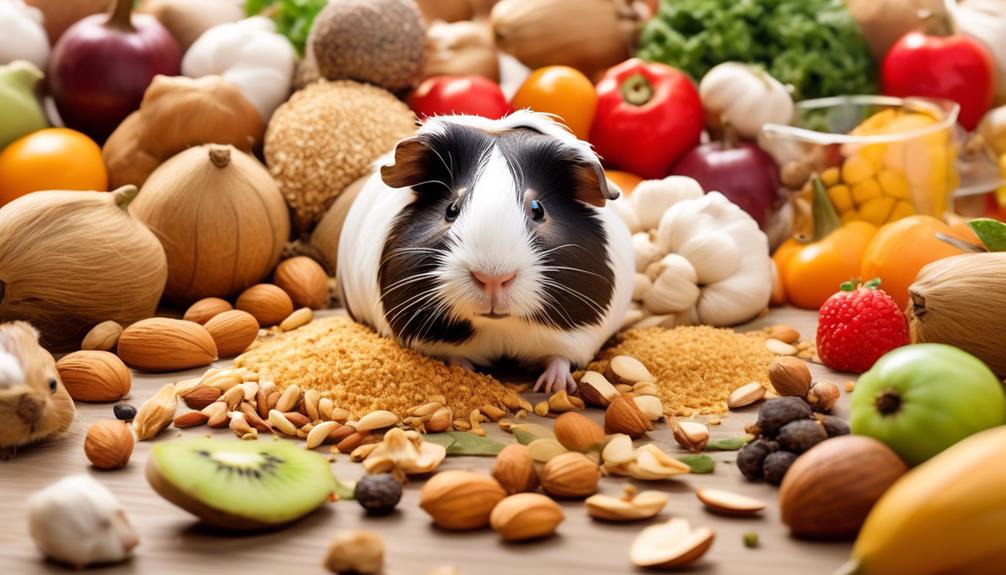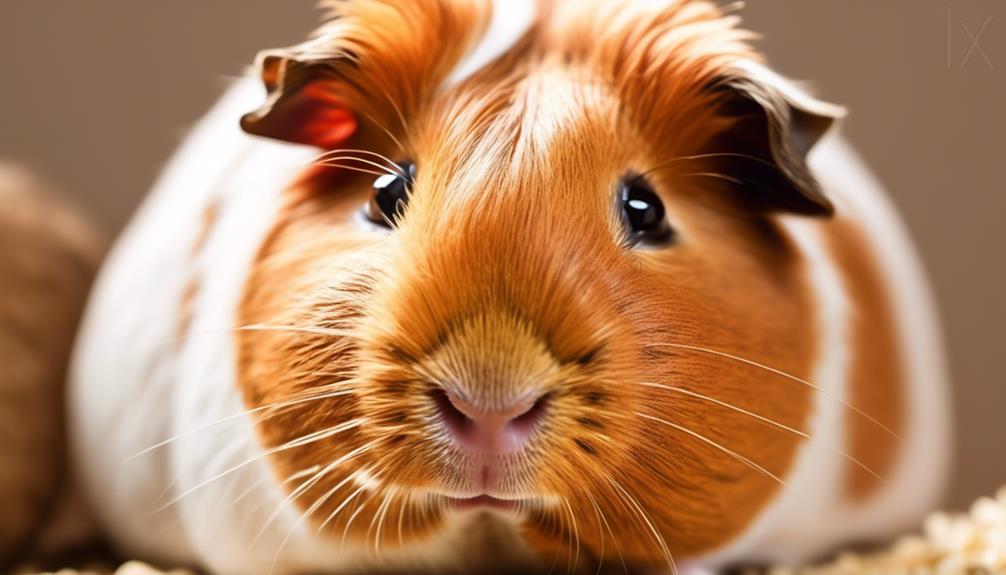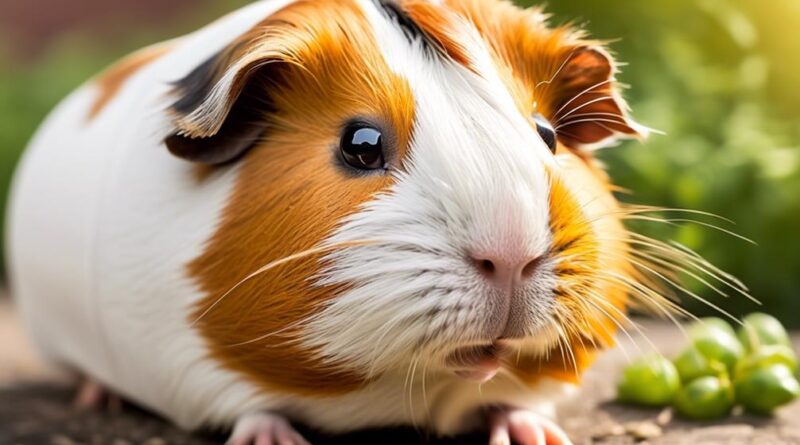Identifying Food Allergy Symptoms in Your Guinea Pig
If your guinea pig has been experiencing some unexpected health issues, it might be worth considering the possibility of food allergies. While it's not always easy to pinpoint the cause of their discomfort, being able to recognize the symptoms of a food allergy can be crucial in providing the best care for your furry friend.
From subtle skin changes to more obvious digestive issues, there are several signs to be aware of that could indicate an allergy. By understanding these symptoms, you can take the necessary steps to ensure your guinea pig's health and well-being.
Common Food Allergy Triggers

If your guinea pig experiences food allergies, common triggers include vegetables like bell peppers, tomatoes, and cucumbers. Allergy trigger identification is crucial for managing your pet's health. Guinea pigs are herbivores, and their digestive systems can be sensitive to certain foods. When introducing new vegetables into your guinea pig's diet, it's important to do so gradually and monitor for any signs of allergy or intolerance.
Dietary modifications may be necessary if your guinea pig shows signs of food allergies. Eliminating the specific trigger foods from their diet is the first step. Replace the allergenic vegetables with safer options such as leafy greens, carrots, or small amounts of fruits like apples or berries. Keep in mind that hay should make up the majority of your guinea pig's diet, along with high-quality guinea pig pellets.
It's essential to observe your guinea pig's response to dietary changes closely. Document any symptoms or changes in behavior that occur after modifying their food. This information can be helpful for your veterinarian in diagnosing and managing your guinea pig's food allergies. Remember, every guinea pig is unique, and what triggers allergies in one guinea pig may not affect another. Patience and attentiveness to your pet's dietary needs are key in ensuring their well-being.
Skin-related Allergy Symptoms
When observing your guinea pig for signs of food allergies, it's important to pay attention to skin-related symptoms such as itching, redness, or hair loss. Skin-related allergy symptoms in guinea pigs can often be a result of an improper diet or food allergies. If you notice your guinea pig excessively scratching or biting at its skin, experiencing red or inflamed areas, or showing signs of hair loss, it could be indicative of a food allergy. These symptoms can cause discomfort and distress to your guinea pig, so it's crucial to address them promptly.
Ensuring your guinea pig has a proper diet is essential in preventing food allergies and related skin issues. High-quality guinea pig food that's free from artificial additives and rich in essential nutrients can help minimize the risk of allergies. Additionally, introducing new foods to your guinea pig's diet gradually and in small portions can help identify and prevent potential allergic reactions.
If you suspect that your guinea pig is experiencing skin-related allergy symptoms due to food allergies, seeking a veterinary examination is crucial. A veterinarian can help determine the underlying cause of the symptoms and provide guidance on modifying your guinea pig's diet to alleviate the allergic reactions. They may also recommend specific dietary changes or hypoallergenic food options to mitigate the skin-related symptoms.
Digestive Allergy Symptoms
Consider monitoring your guinea pig for signs such as diarrhea, vomiting, or changes in appetite, as these could indicate digestive allergy symptoms related to its food. Digestive allergy symptoms in guinea pigs can manifest as gastrointestinal distress, causing discomfort and potential health issues. If you notice your guinea pig experiencing diarrhea, it could be a sign of an adverse reaction to certain food ingredients. Additionally, vomiting or regurgitation after consuming specific foods may indicate a digestive allergy. Keep an eye on your guinea pig's eating habits as well, as changes in appetite or refusal to eat certain foods might signal a nutritional imbalance or food intolerance.
Nutritional imbalance in guinea pigs can lead to digestive issues, making it crucial to ensure that your pet's diet is well-balanced and meets its nutritional needs. Gastrointestinal distress, such as gas, bloating, or stomach pain, may also be indicative of a digestive allergy. Pay attention to your guinea pig's behavior and physical cues, as they can provide valuable insight into its digestive health.
If you suspect that your guinea pig is experiencing digestive allergy symptoms, consult a veterinarian for a thorough evaluation. They can help identify the specific allergen or nutritional issue and provide guidance on adjusting your guinea pig's diet to alleviate digestive discomfort. Remember to introduce any dietary changes gradually to minimize stress on your guinea pig's digestive system.
Respiratory Allergy Symptoms
To further understand your guinea pig's well-being, it's important to recognize potential respiratory allergy symptoms that may arise, complementing your vigilance for digestive issues.
Respiratory allergy symptoms in guinea pigs can manifest as sneezing, coughing, wheezing, labored breathing, nasal discharge, and watery eyes. If you notice any of these symptoms, it's crucial to consult a veterinarian promptly.
Environmental factors play a significant role in triggering respiratory allergies in guinea pigs. Dust, pollen, mold, and cigarette smoke are common allergens that can exacerbate respiratory issues. Ensuring a clean living environment with good ventilation and minimal exposure to potential respiratory irritants can help prevent allergic reactions.
If you suspect that your guinea pig is experiencing respiratory allergies, allergy testing may be recommended by your veterinarian to identify specific allergens. This can help in implementing targeted preventive measures to minimize allergen exposure.
When it comes to treatment options, your veterinarian may prescribe antihistamines or corticosteroids to alleviate respiratory allergy symptoms in guinea pigs. Additionally, maintaining a clean and dust-free living space for your pet and regular cage cleaning can aid in reducing the impact of respiratory allergens.
Behavioral Changes
Behavioral changes in guinea pigs can indicate underlying health issues or emotional distress, requiring attentive observation and prompt action. Stress-induced behavior changes in guinea pigs may include excessive chewing or scratching, increased hiding, or decreased activity. These changes can be triggered by environmental allergies, such as exposure to pollen, dust, or mold. If you notice your guinea pig displaying these behaviors, it's important to consider potential environmental allergy triggers in their living environment.
Environmental allergy triggers, such as pollen from hay or bedding, can cause stress-induced behavior changes in guinea pigs. Symptoms may include increased anxiety, restlessness, or a decrease in overall engagement. Additionally, changes in appetite, such as a decrease in food consumption, could also indicate stress or discomfort caused by environmental allergies. Paying close attention to your guinea pig's behavior and the environmental factors in their living space can help you identify and address potential allergy triggers.
When observing behavioral changes in your guinea pig, consider any recent changes in their living environment, such as new bedding or a different brand of hay. These changes could be the source of stress-induced behaviors. It's important to consult with a veterinarian if you suspect that your guinea pig's behavior is being influenced by environmental allergies. Taking proactive measures to address potential allergy triggers can help improve your guinea pig's overall well-being.
Hair Loss and Itching
If your guinea pig is experiencing environmental allergies, such as those from bedding or hay, you may notice signs of hair loss and itching. These symptoms are often indicative of skin irritation caused by an allergic reaction.
Here are some important points to consider regarding hair loss and itching in guinea pigs:
- Excessive Scratching: If you observe your guinea pig scratching excessively, especially in specific areas of their body, this could be a sign of itching caused by an environmental allergy. Pay close attention to their behavior and note any patterns of scratching.
- Patchy Hair Loss: Hair loss, particularly in patches, may be a visible indication of an allergic reaction. Check for any bald spots or areas where the fur seems to be thinning. This could be a result of your guinea pig biting or scratching at their skin due to discomfort.
- Redness or Irritation: Look for any redness, inflammation, or irritation on your guinea pig's skin. These visual cues can be strong indicators of an allergic response to certain environmental elements.
- Consider Allergy Testing: If you suspect that your guinea pig is suffering from environmental allergies leading to hair loss and itching, it may be beneficial to consult a veterinarian for allergy testing. This can help identify specific allergens causing the reaction, allowing for targeted treatment and management.
Addressing hair loss and itching in your guinea pig caused by environmental allergies is essential for their well-being. By closely monitoring their symptoms and seeking appropriate veterinary care, you can help alleviate their discomfort and ensure a healthy, happy pet.
Eye and Ear Irritation

Eye and ear irritation in guinea pigs can be indicative of potential health issues that require careful attention and monitoring. These symptoms may present as redness, discharge, or excessive tearing in the eyes, and head shaking, scratching, or inflammation around the ears. Environmental factors such as exposure to dust, smoke, or strong odors can trigger irritation, while genetic predisposition can make some guinea pigs more susceptible.
If you notice any signs of eye or ear irritation, it's crucial to consult a veterinarian promptly.
When it comes to treatment options, your vet may recommend gentle cleaning of the affected areas to remove any irritants or discharge. They might also prescribe eye drops or ear drops to alleviate the irritation and reduce inflammation. Prevention strategies include keeping your guinea pig's living environment clean and free from potential irritants. Regularly cleaning their cage, providing fresh bedding, and ensuring good ventilation can help minimize the risk of eye and ear irritation.
Additionally, consider avoiding smoking near your guinea pig and keeping them away from strong chemicals or perfumes. If genetic predisposition is suspected, your vet may suggest certain dietary adjustments or supplements to support your guinea pig's overall health.
Seeking Veterinary Care
When seeking veterinary care for your guinea pig, promptly schedule an appointment with a qualified veterinarian experienced in treating small animals. It's important to seek professional help when you suspect your guinea pig is suffering from food allergies.
Here's what you can expect when seeking veterinary care for your guinea pig:
- Allergy Testing: The veterinarian may recommend allergy testing to identify specific food allergens affecting your guinea pig. This can involve blood tests or elimination diets to pinpoint the allergen causing the adverse reactions in your pet.
- Treatment Options: After diagnosing the food allergy, the vet will discuss treatment options with you. This may include dietary changes, such as switching to a hypoallergenic guinea pig food, or the introduction of supplements to alleviate the allergic symptoms. In some cases, medication or allergy shots may be prescribed to manage the allergic reactions.
- Monitoring and Follow-Up: The veterinarian will provide guidance on how to monitor your guinea pig for any signs of improvement or worsening symptoms. They'll also schedule follow-up appointments to assess the progress and make any necessary adjustments to the treatment plan.
- Preventive Measures: Your vet will also advise you on preventive measures to minimize the risk of future allergic reactions in your guinea pig. This may involve avoiding certain foods, environmental changes, or other proactive steps to safeguard your pet's health.
Seeking veterinary care is crucial in addressing food allergies in guinea pigs, and with the right support and guidance, you can help your pet lead a comfortable and healthy life.
Frequently Asked Questions
Can Guinea Pigs Develop Food Allergies Later in Life, or Are They Born With Them?
You can develop food allergies later in life. Allergy testing can help identify early signs. Keep an eye on any changes in behavior or physical symptoms, and consult a veterinarian if you suspect your guinea pig has developed food allergies.
Are There Any Specific Breeds of Guinea Pigs That Are More Prone to Food Allergies?
Specific breeds of guinea pigs can be more prone to food allergies due to genetic predispositions. Common allergy triggers include hay, certain fruits, and vegetables. It's important to monitor your guinea pig's reaction to different foods.
How Can I Prevent My Guinea Pig From Developing Food Allergies?
To prevent allergies in your guinea pig, make dietary adjustments by introducing new foods gradually and observing for allergy symptoms like itching or rashes. This proactive approach can help you identify and avoid potential allergens.
Are There Any Alternative Treatments or Remedies for Food Allergies in Guinea Pigs?
You can try natural remedies for your guinea pig's food allergies, like herbal supplements. Consider behavioral changes and environmental modifications to alleviate symptoms. Always consult a vet before introducing new treatments.
Can Food Allergies in Guinea Pigs Lead to Other Health Issues or Complications?
Food allergies in guinea pigs can lead to complications such as digestive issues and skin problems. Treatment options include eliminating allergens from their diet and providing supportive care. Prevention tips involve gradually introducing new foods to avoid allergy development.
Conclusion
If you notice any of these symptoms in your guinea pig, it's important to seek veterinary care as soon as possible.
By identifying and avoiding potential food allergy triggers, you can help keep your furry friend healthy and happy. Remember to always monitor their behavior, skin, and digestion, and don't hesitate to consult with a professional if you have any concerns.
Your guinea pig's well-being is worth the extra attention and care.
